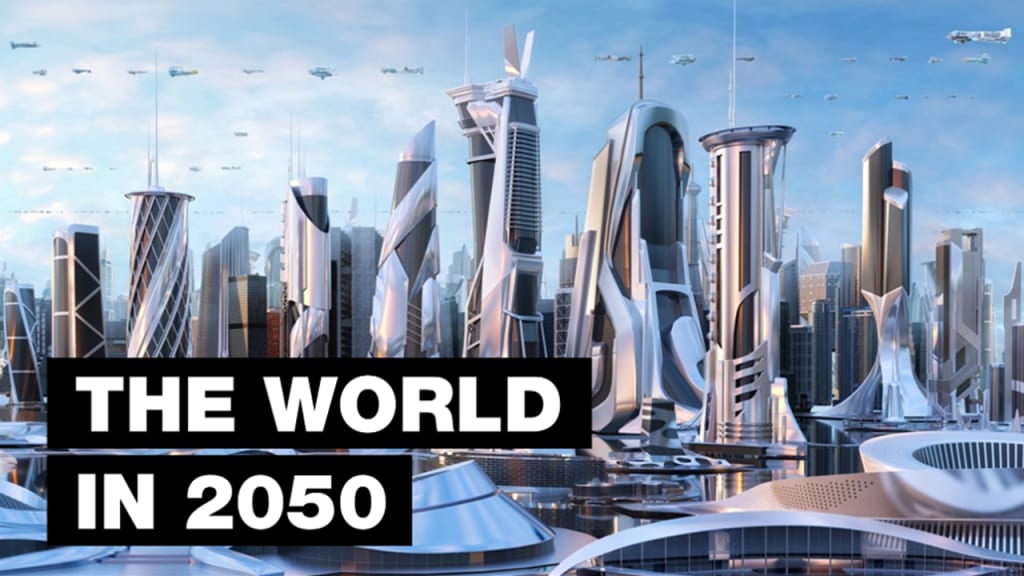
The development of future technology is a complex and constantly evolving topic. However, there are some key trends that are likely to shape the future of technology.
I. Artificial intelligence (AI): AI has been one of the most significant technological advancements of recent years, and it is likely to continue to develop at a rapid pace. Advancements in AI are expected to impact fields such as healthcare, finance, transportation, and many more.
II. Internet of Things (IoT): The IoT refers to the connection of everyday devices to the internet, allowing for data to be collected and shared. This technology is likely to become more prevalent as devices become more sophisticated and the demand for data-driven insights grows.
III. Blockchain: Blockchain technology has the potential to revolutionize industries such as finance, supply chain management, and more. It is likely to continue to develop and become more widely adopted in the coming years.
IV. 5G Networks: The rollout of 5G networks will provide faster speeds and lower latency, making it possible to support emerging technologies such as autonomous vehicles, smart cities, and more.
V. Biotechnology: Advances in biotechnology, including gene editing and synthetic biology, are likely to have a significant impact on healthcare and other fields.
Overall, future technology is likely to become more advanced and interconnected, with a greater focus on data-driven insights and automation. However, as technology advances, it is important to consider ethical and societal implications and to ensure that these technologies are developed and used in a responsible and sustainable manner.
I. Artificial intelligence (AI):
Artificial intelligence (AI) has emerged as one of the most significant technological advancements of recent years, with the potential to transform numerous industries and change the way we live and work. AI involves the development of intelligent machines that can perform tasks that typically require human intelligence, such as learning, problem-solving, and decision-making. Advancements in AI are expected to impact fields such as healthcare, finance, transportation, and many more in the coming years.
In the field of healthcare, AI has the potential to revolutionize how diseases are diagnosed, treated, and prevented. AI algorithms can analyze large amounts of medical data, such as patient histories, lab results, and images, to identify patterns and predict outcomes. This can help doctors make more accurate diagnoses and develop personalized treatment plans based on a patient's unique genetic makeup and medical history. AI can also help healthcare providers streamline administrative tasks and reduce costs, freeing up more time to focus on patient care.
In the financial industry, AI has the potential to automate many tasks, such as fraud detection, risk assessment, and investment management. AI algorithms can analyze large amounts of financial data to identify patterns and anomalies, allowing for quicker and more accurate decision-making. AI-powered chatbots can also provide customer service and support, improving the customer experience and reducing costs for financial institutions.
In the transportation industry, AI is already being used to improve safety and efficiency. Self-driving cars, for example, use AI algorithms to analyze sensor data and make real-time decisions about driving, such as when to brake, accelerate, or change lanes. This technology has the potential to reduce accidents caused by human error and improve traffic flow. AI is also being used in logistics and supply chain management to optimize routes, reduce costs, and improve delivery times.
Beyond these industries, AI has the potential to impact many others, including education, manufacturing, and entertainment. For example, AI-powered educational software can personalize learning experiences for students, providing individualized instruction and feedback based on their progress and learning style. In manufacturing, AI can be used to optimize production processes, reduce waste, and improve quality control. In entertainment, AI can be used to create more realistic and engaging virtual worlds and characters, enhancing the overall gaming and movie-watching experience.
Despite the numerous benefits of AI, there are also concerns about its impact on society. One major concern is the potential loss of jobs as more tasks are automated. However, proponents of AI argue that it will create new jobs in fields such as data analysis and software engineering. Another concern is the potential for AI to perpetuate biases and discrimination, particularly in areas such as hiring and lending decisions. To address these concerns, it is important to ensure that AI algorithms are transparent and fair, and that they are developed and used in an ethical and responsible manner.
In conclusion, AI has the potential to revolutionize numerous industries and transform the way we live and work. It has already shown promise in areas such as healthcare, finance, and transportation, and is likely to become more prevalent in the coming years. While there are concerns about its impact on society, it is important to embrace AI as a tool for progress and to ensure that it is developed and used in a responsible and sustainable manner. By doing so, we can unlock the full potential of this transformative technology and create a better future for all.
II. Internet of Things (IoT):
The Internet of Things (IoT) is a term used to describe the growing network of everyday devices that are connected to the internet, allowing them to collect and share data. This technology has the potential to revolutionize numerous industries and change the way we live and work. As devices become more sophisticated and the demand for data-driven insights grows, the IoT is likely to become even more prevalent in the coming years.
One area where the IoT is already having a significant impact is in the realm of smart homes. By connecting devices such as thermostats, lighting, and security systems to the internet, homeowners can control and monitor their homes remotely using a smartphone or other device. This technology can help improve energy efficiency, increase home security, and provide greater convenience for homeowners.
In the healthcare industry, the IoT has the potential to improve patient outcomes and reduce costs. By connecting medical devices such as blood pressure monitors and glucose meters to the internet, doctors and other healthcare professionals can monitor patients remotely and receive real-time data about their health. This can help identify potential health issues early and allow for more proactive treatment. Additionally, the IoT can help reduce healthcare costs by enabling remote consultations and reducing the need for in-person visits.
In the transportation industry, the IoT is already being used to improve safety and efficiency. Connected cars, for example, can communicate with each other and with traffic infrastructure to help reduce accidents and improve traffic flow. Additionally, the IoT can be used in logistics and supply chain management to track shipments and improve efficiency.
The IoT also has the potential to impact industries such as agriculture, manufacturing, and retail. In agriculture, connected sensors can monitor soil conditions and weather patterns, helping farmers optimize crop yields and reduce water usage. In manufacturing, the IoT can be used to monitor production processes and identify potential issues before they become major problems. In retail, the IoT can be used to track inventory and provide personalized shopping experiences for customers.
Despite the many benefits of the IoT, there are also concerns about privacy and security. With so many devices collecting and sharing data, there is a risk that sensitive information could be compromised. Additionally, there are concerns about the potential for cyber attacks on IoT devices, which could have serious consequences.
To address these concerns, it is important to ensure that IoT devices are designed with security in mind from the outset. This includes implementing strong encryption protocols, regularly updating firmware to address security vulnerabilities, and providing users with clear information about how their data is being used.
In conclusion, the IoT is a technology with the potential to transform numerous industries and change the way we live and work. Already, it is having an impact in areas such as smart homes, healthcare, and transportation, and it is likely to become even more prevalent in the coming years. However, it is important to address concerns about privacy and security to ensure that the benefits of this technology can be realized without putting users at risk.
III. Blockchain:
Blockchain technology has the potential to revolutionize the way we conduct transactions and store data. At its core, a blockchain is a decentralized and immutable ledger that allows for secure and transparent transactions without the need for intermediaries. While its origins can be traced back to the creation of Bitcoin in 2008, blockchain has evolved beyond cryptocurrencies and has found use cases in a variety of industries.
One of the industries that is likely to be most impacted by blockchain technology is finance. Traditional financial systems rely on intermediaries such as banks, clearinghouses, and payment processors to facilitate transactions. These intermediaries add cost, complexity, and friction to the process, which can lead to delays and errors. Blockchain technology allows for transactions to be conducted directly between parties without the need for intermediaries. This can reduce costs and increase the speed and efficiency of transactions.
Another area where blockchain technology is likely to have a significant impact is supply chain management. Supply chains are complex systems that involve multiple parties, including suppliers, manufacturers, distributors, and retailers. Each of these parties typically maintains their own records of transactions and inventory, which can lead to discrepancies and errors. Blockchain technology allows for a single source of truth that all parties can access, which can increase transparency and accountability. It also allows for the tracking of goods and materials throughout the supply chain, which can help to prevent fraud and counterfeiting.
Beyond finance and supply chain management, blockchain technology has the potential to impact a wide range of industries, including healthcare, real estate, and government. In healthcare, for example, blockchain technology can be used to securely store and share patient data, which can help to improve the quality of care and reduce costs. In real estate, blockchain technology can be used to streamline the buying and selling process, reducing the need for intermediaries such as real estate agents and title companies. In government, blockchain technology can be used to increase transparency and accountability, particularly in areas such as voting and public recordkeeping.
While blockchain technology has the potential to revolutionize many industries, there are also challenges that must be addressed. One of the biggest challenges is scalability. Current blockchain systems can struggle to handle large volumes of transactions, which can lead to delays and high fees. There is also a need for greater standardization and interoperability between different blockchain systems to allow for seamless transactions between parties.
Another challenge is regulation. As blockchain technology continues to develop, there is a need for clear regulatory frameworks to be put in place to ensure that it is being used in a safe and responsible manner. This is particularly important in industries such as finance, where the potential for fraud and money laundering is high.
Despite these challenges, blockchain technology is likely to continue to develop and become more widely adopted in the coming years. As more use cases are discovered and more companies invest in blockchain development, we can expect to see significant advancements in the technology. Ultimately, blockchain has the potential to transform the way we conduct transactions and store data, leading to greater efficiency, transparency, and security across a wide range of industries.
IV. 5G Networks:
5G networks are the next generation of mobile networks that promise to revolutionize the way we use the internet. With speeds up to 100 times faster than 4G, 5G networks have the potential to transform industries ranging from healthcare to transportation to entertainment. In this essay, we will explore the development of 5G networks and their potential impact.
The development of 5G networks has been driven by the need for faster and more reliable connectivity. As more and more devices become connected to the internet, from smartphones to IoT devices, there is an increasing demand for bandwidth. 5G networks promise to meet this demand by providing faster speeds and lower latency.
One of the key features of 5G networks is their ability to support massive machine-type communications. This means that they can handle a large number of connected devices simultaneously, making them ideal for IoT applications. This has the potential to revolutionize industries such as healthcare and transportation by enabling real-time monitoring and communication between devices.
Another feature of 5G networks is their ability to support ultra-reliable low-latency communications (URLLC). This means that they can provide extremely fast and reliable communication, with latency as low as 1 millisecond. This has the potential to revolutionize industries such as autonomous vehicles and robotics, where real-time communication is critical.
The development of 5G networks is also expected to have a significant impact on the entertainment industry. With faster speeds and lower latency, 5G networks will enable high-quality streaming of video and other content, making it possible to watch movies and play games without any lag or buffering.
While the development of 5G networks has the potential to revolutionize many industries, there are also challenges that must be addressed. One of the biggest challenges is the cost of deployment. 5G networks require a significant investment in infrastructure, including new base stations and fiber optic cables. This investment can be challenging for smaller service providers and may lead to a digital divide between urban and rural areas.
Another challenge is the issue of security. 5G networks are vulnerable to cyber attacks, and there is a need for robust security measures to be put in place to ensure that sensitive data is protected. This is particularly important in industries such as healthcare and finance, where the potential for data breaches is high.
Despite these challenges, the development of 5G networks is expected to continue, with many countries investing heavily in the technology. In the United States, for example, the Federal Communications Commission has made the deployment of 5G networks a priority, with plans to make more spectrum available for use by service providers.
In conclusion, 5G networks have the potential to revolutionize the way we use the internet, enabling faster and more reliable communication between devices. While there are challenges that must be addressed, such as the cost of deployment and the issue of security, the development of 5G networks is expected to continue, with many countries investing heavily in the technology. As more and more devices become connected to the internet, 5G networks will play an increasingly important role in enabling the next generation of technological innovation.
V. Biotechnology:
The development of biotechnology has the potential to revolutionize healthcare and many other fields. Biotechnology involves the use of living organisms or biological processes to create or modify products, processes, or services. Advances in biotechnology, including gene editing and synthetic biology, are likely to have a significant impact on healthcare and other fields.
One of the most promising areas of biotechnology is gene editing. Gene editing is a technology that allows scientists to modify the DNA of living organisms. This technology has the potential to cure genetic diseases by correcting or replacing defective genes. It could also be used to make crops more resistant to disease and pests, and to create new materials with unique properties.
Another area of biotechnology that has the potential to revolutionize healthcare is synthetic biology. Synthetic biology involves the design and creation of new biological systems that do not exist in nature. This technology has the potential to create new medicines, such as vaccines, that are more effective and have fewer side effects. It could also be used to create new materials, such as biofuels, that are more sustainable and environmentally friendly.
In addition to healthcare, biotechnology is likely to have a significant impact on many other fields, including agriculture, energy, and environmental science. For example, biotechnology could be used to create crops that are more resistant to drought and other environmental stresses. It could also be used to create new sources of renewable energy, such as biofuels and biogas.
Despite the potential benefits of biotechnology, there are also concerns about its safety and ethical implications. For example, gene editing raises ethical questions about the creation of "designer babies" and the potential for unintended consequences. There are also concerns about the use of biotechnology in agriculture and its potential impact on the environment.
To address these concerns, it is important to have appropriate regulations and guidelines in place. Governments and international organizations have a role to play in ensuring that biotechnology is developed in a safe and responsible manner. This includes ensuring that new biotechnologies are rigorously tested before they are introduced into the environment or used in humans.
In conclusion, advances in biotechnology, including gene editing and synthetic biology, have the potential to revolutionize healthcare and many other fields. While there are concerns about safety and ethics, appropriate regulations and guidelines can help ensure that these technologies are developed in a responsible manner. As biotechnology continues to develop, it is important to consider both the potential benefits and the potential risks, and to work together to ensure that these technologies are used for the greater good.
The development of future technology is a constantly evolving and complex topic, but there are some key trends that are expected to shape the future of technology.
Artificial Intelligence (AI) has been one of the most significant technological advancements in recent years, with potential impacts on many fields including healthcare, finance, and transportation. The development of AI is expected to continue at a rapid pace.
The Internet of Things (IoT) is the connection of everyday devices to the internet, enabling the collection and sharing of data. As devices become more sophisticated, the demand for data-driven insights is expected to grow, making IoT more prevalent.
Blockchain technology has the potential to revolutionize industries such as finance and supply chain management. It is expected to continue to develop and become more widely adopted in the coming years.
The rollout of 5G networks is expected to provide faster speeds and lower latency, making it possible to support emerging technologies such as autonomous vehicles and smart cities.
Advances in biotechnology, including gene editing and synthetic biology, are likely to have a significant impact on healthcare and other fields. However, there are concerns about safety and ethical implications, and appropriate regulations and guidelines are needed to ensure these technologies are developed responsibly.
Overall, the future of technology is expected to be shaped by a combination of these key trends and others that will continue to emerge. It is important to consider both the potential benefits and risks of these technologies and to work towards their responsible development and implementation.
by-kiri
About the Creator
kiri
let's just write and guess who is going to guess
tamil pesuravanga pesinaal ethaachchu puriya vaayppu irukku






Comments (1)
Correct